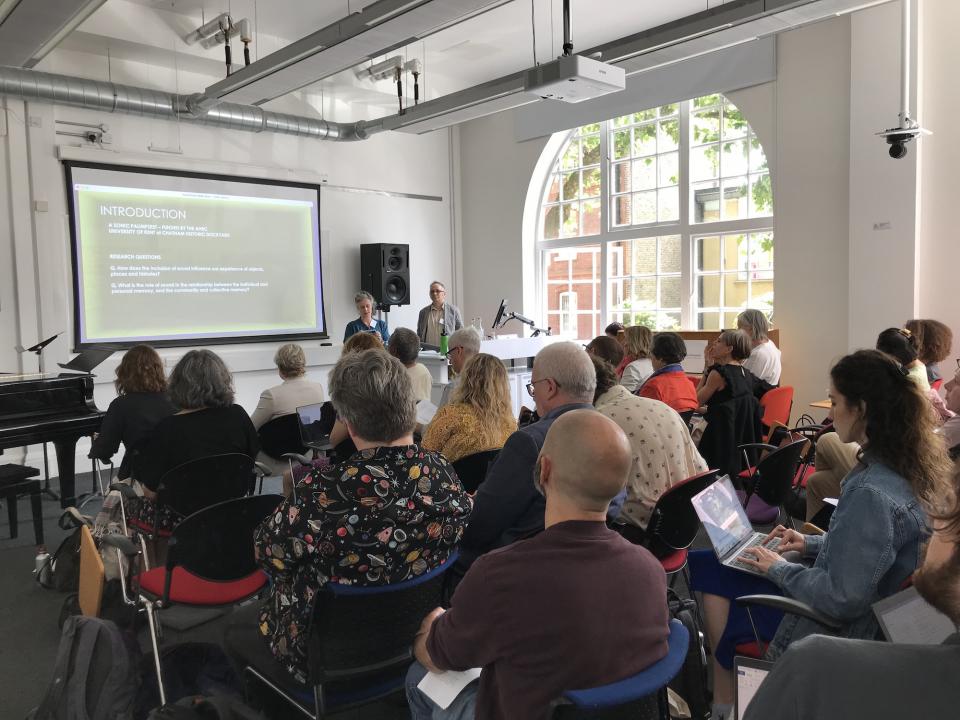
Decolonising Sonic Heritage Spaces
How might sound be used in heritage spaces such as museums and historic houses to uncover hidden histories and to centre historically marginalised or silenced voices and perspectives, particularly in relation to current debates over ‘decolonisation’? This was the focus of a workshop held at City, University of London on 19th June 2023. The event was convened by Laudan Nooshin (City University) and Maria Mendonça (Kenyon College, US) as part of their wider project that explores sound as a tool of public engagement, learning and critique in heritage contexts.
Aware of a wealth of sonic – and more broadly sensory - activity happening in museums and historic houses, Laudan and Maria wanted to bring together heritage professionals and academics to open up a dialogue and to share experiences. The workshop was attended by about 50 people, with curators, archivists and public engagement staff from a range of organisations including the V&A, Science Museum, Museum of London, Museum of the Home, Horniman Museum, National Trust and the British Library, as well as historians, sound artists, composers and music scholars.
The day was structured to encourage as much discussion and exchange of ideas as possible: a series of presentations was followed by breakout groups that focused on issues and themes that arose during the day, and a final plenary.
In the presentations, James Bulgin (Imperial War Museum, London; lead curator on the new Holocaust Galleries that received the 2022 Museum + Heritage Permanent Exhibition of the Year Award) talked about the close relationship with the sound design team at Idee und Klang, and how what he termed the ‘sensory nexus’ was central to the exhibition design from the start. Artistic researcher John Kannenberg introduced his online ‘Museum of Portable Sound’ and reflected on its collection principles as a method for decolonisation. Curator and visitor experience consultant Susanna Austin described her work in three National Trust properties: Coleridge Cottage, The Vyne (Hampshire) and Southwell Workhouse (Nottinghamshire). At Southwell, she devised an audio guide that ‘recreated’ marginalised voices from the workhouse based on documents in the National Archives. Jeanice Brooks (University of Southampton) and Wiebke Thormählen (Royal Northern College of Music) also considered marginalised voices, with a particular focus on ‘race’ and gender, in their presentation on work in historic houses during the AHRC funded project ‘Music, Home and Heritage’, exploring how a sonic perspective can offer historical ‘counter narratives’ that can transform our understandings of people’s lives. Aki Pasoulas (University of Kent) and Brona Martin (University of Birmingham) spoke about another AHRC project exploring the sounds of the Historic Dockyards at Chatham, including a sound installation and online tools. Mariana López (University of York)’s presentation considered how to diversify research in acoustical heritage and historical soundscapes, while Rachel Cowgill (University of York) explored how these considerations have informed work on the Street Life project in York. Sound artist Louise K. Wilson (University of Leeds) described her work creating audio pieces for the Holocaust Centre North in Huddersfield, revealing the challenges of using sound to construct a narrative for what is no longer there, what has been ‘lost, stolen or chosen not to share’.
Central themes of the day included the multiple meanings of the term ‘decolonisation’, and how sound can generate debate around these highly sensitive issues and provide a means of interrogating the meaning of decolonisation ‘itself’; how to engage with and represent difficult and painful histories and the ethical issues raised; and future directions for this type of work. Attendees clearly welcomed the opportunity to meet others working in this area, to engage in discussion and to share experiences, and there was a strong desire to continue these conversations going forward. For more information, please contact Laudan Nooshin (l.nooshin@city.ac.uk) or Maria Mendonça (mendoncam@kenyon.edu).
We are very grateful to the Higher Education Innovation Fund for supporting the event and to everyone who attended, particularly the speakers for sharing their work.
Full details of the day are listed HERE
And a link to videos of the presentations can be accessed HERE
